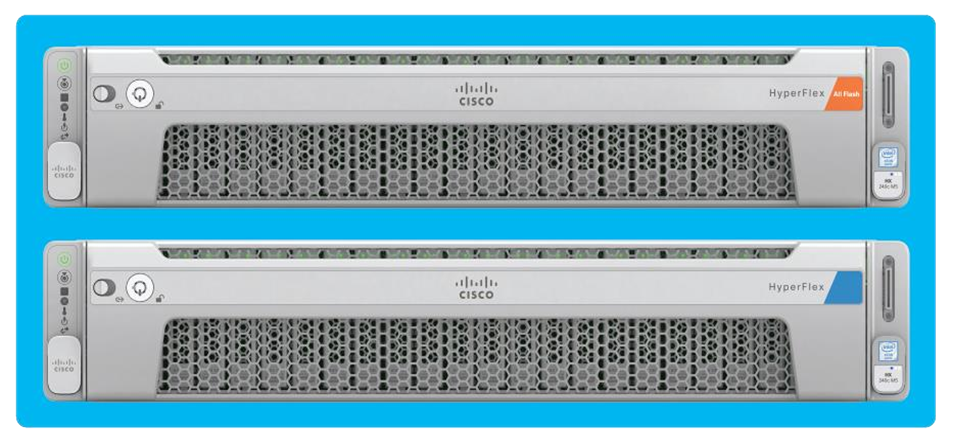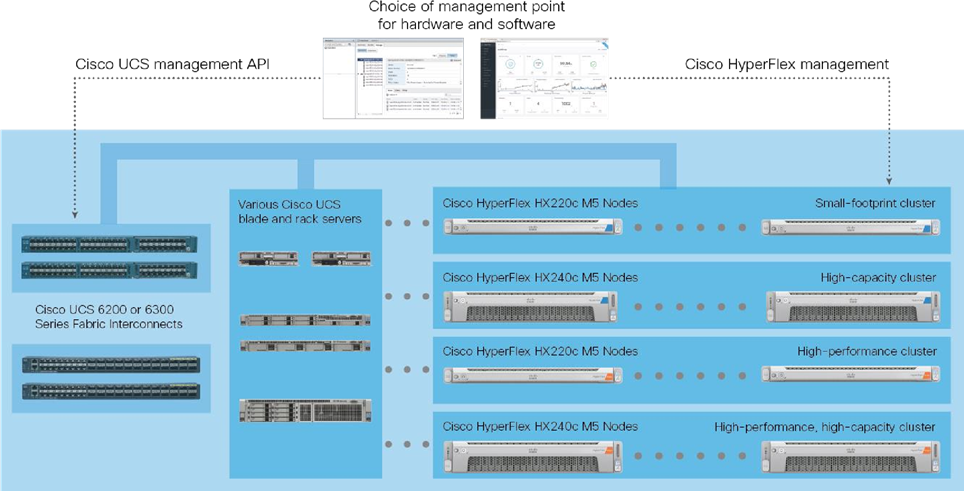Cisco HyperFlex HX240c M5 Node and HX240c M5 All Flash Node
Available Languages
Bias-Free Language
The documentation set for this product strives to use bias-free language. For the purposes of this documentation set, bias-free is defined as language that does not imply discrimination based on age, disability, gender, racial identity, ethnic identity, sexual orientation, socioeconomic status, and intersectionality. Exceptions may be present in the documentation due to language that is hardcoded in the user interfaces of the product software, language used based on RFP documentation, or language that is used by a referenced third-party product. Learn more about how Cisco is using Inclusive Language.
 |
Hyperconvergence engineered on the fifth-generation Cisco UCS platform
Mobility, big data, and the Internet of Everything (IoE) are changing application architectures and IT delivery models. Keeping pace requires a systems-centric strategy in your data center. Cisco HyperFlex™ systems deliver adaptability with complete hyperconvergence. These innovative systems combine software-defined networking and computing with the next-generation Cisco HyperFlex HX Data Platform. Engineered on the Cisco Unified Computing System™ (Cisco UCS®), Cisco HyperFlex systems deliver pay-as-you-grow economics and extend model-based management to the cloud.
Simplicity you can build on
With hybrid or all-flash-memory storage configurations and a choice of management tools, Cisco HyperFlex systems are deployed as a preintegrated cluster with a unified pool of resources that you can quickly provision, adapt, scale, and manage to efficiently power your applications and your business (Figure 1).
Cisco HyperFlex systems now include Cisco UCS M5 rack servers. Based on Intel® Xeon® Scalable processors, these fifthgeneration servers have faster processors, more cores, and faster and larger-capacity memory than previous-generation servers. In addition, they are ready for Intel 3D XPoint nonvolatile memory, which can be used as both storage and system memory, increasing your virtual server configuration options and flexibility for applications.
Cisco HyperFlex HX240c M5 Node and HX240c M5 All Flash Node
Physically, the system is delivered as a cluster of three or more Cisco HyperFlex HX240c M5 Nodes or HX240c M5 All Flash
Nodes that are integrated into a single system by a pair of Cisco UCS 6200 or 6300 Series Fabric Interconnects. The HX240c M5 Node is excellent for high-capacity clusters, and the HX240c M5 All Flash Node is excellent for highperformance, high-capacity clusters. Each node configuration includes the following (for details, see Table 1):
● Hard-disk drives (HDDs) with 27.6 TB or solid-state disk (SSD) drives with up to 87.4 TB of capacity-layer storage (self-encrypting drive options are available)
● Write-logging SAS SSD or Non-Volatile Memory Express (NVMe) drive (self-encrypting drive options are available)
● Data platform logging drive
● M.2 boot drive for VMware vSphere
● One Cisco UCS virtual interface card (VIC)
● VMware vSphere ESXi 6.0 software preinstalled (ESXi 6.5 is supported but is not preinstalled)
● Cisco UCS service profile templates for automated cluster configuration
All nodes use Intel Xeon Scalable CPUs and next-generation DDR4 memory and offer 12-Gbps SAS throughput. They deliver significant performance and efficiency gains and outstanding levels of adaptability in a 2-rack-unit (2RU) form factor.

Hybrid configurations
The HX240c M5 Node and HX240c M5 All Flash Node can be deployed with various Cisco UCS B-Series Blade Servers and C-Series Rack Servers to create a hybrid cluster. With a single point of connectivity and management, you can easily scale your cluster to support more workloads and deliver the performance, bandwidth, and low latency that your users and applications need.
Product features and benefits
Table 1 summarizes the features and benefits of the HX240c M5 Node and HX240c M5 All Flash Node.
Table 1. Features and benefits
| Feature |
Benefit |
| Memory |
Up to 3 TB of memory Capability to use 16-, 32-, 64-GB, or 128-GB DIMMs |
| 1 or 2 Intel Xeon Scalable processors |
Built on 14-nanometer (nm) processor technology, Intel Xeon Scalable processors are designed to deliver highly robust capabilities with outstanding performance, security, and agility. Up to 28 cores in 2-socket configurations Top-of-the-line memory-channel performance Three Intel Ultra Path Interconnect (UPI) links across sockets for improved scalability and intercore data flow Hardware-assisted security advancements Low-power, high-speed DDR4 memory technology Increased performance with Intel Automated Vector Extensions 2 (AVX2) Increased virtual machine density Automated energy efficiency that reduces energy costs by automatically putting the processor and memory in the lowest available power state while still delivering the performance required Flexible virtualization technology that optimizes performance for virtualized environments, including processor support for migration and direct I/O Innovation with the latest processors, which increase processor frequency and improve security With the increased performance provided by the Intel Xeon Scalable processors, Cisco HyperFlex HX-Series nodes offer an improved price-to-performance ratio, making HX-Series systems among the best values in the industry. |
| Support for up to 6 PCI Express (PCIe) 3.0 slots, 4 of which are full-height, full-length |
Flexibility, increased performance, and compatibility with industry standards High I/O bandwidth, increased flexibility, and backward compatibility with support for PCIe 2.0 2 slots capable of graphics processing unit (GPU) support for enhanced virtual desktop infrastructure (VDI) capabilities |
| Modular LAN on motherboard (mLOM) |
Cisco UCS VICs provide up to 256 I/O devices programmable on demand for hypervisor and virtual machine support. Cisco UCS VIC 1387 provides 2 x 40-Gbps network connectivity to Cisco UCS 6300 Series Fabric Interconnects. 10-Gbps QSFP-to-SFP adapters (QSAs) are available when connection to Cisco UCS 6200 Series Fabric Interconnect is desired. |
| Unified network fabric |
Low-latency, lossless, 2 x 40 Gigabit Ethernet Wire-once deployment model, eliminating the need to install adapters and recable racks and switches when changing I/O configurations Fewer interface cards, cables, and upstream network ports to purchase, power, configure, and maintain |
| Virtualization optimization |
I/O virtualization and Intel Xeon Scalable processor features, extending the network directly to virtual machines Consistent and scalable operational model Increased security and efficiency with reduced complexity Capability to move virtual machine security features and policies from rack to rack or rack to blade |
| Choice of management tools |
Managed as a single entity through a vSphere web client plug-in or through the Cisco HyperFlex Connect HTML5 interface Built-in role- and policy-based management through service profiles and templates, enabling more effective use of skilled server, network, and storage administrators Automated provisioning and increased business agility, allowing data center managers to provision applications in minutes rather than days by associating a service profile with a new, added, or repurposed HX240c M5 Node or HX240c All Flash Node |
| Storage |
All-flash-memory or hybrid (HDD and SSD memory) storage configurations High-capacity configurations for the HX Data Platform capacity layer HX240c M5 All Flash Node: Up to 23 x 3.8-TB or 23 x 960-GB SSDs for the capacity tier and 1 SAS SSD or NVMe write-logging drive HX240c M5 All Flash Node with self-encrypting drives: Up to 23 x 800-GB self-encrypting SSDs or 23 x 960-GB or 23 x 3.8-TB drives for the capacity tier and 1 self-encrypting SSD write-logging drive HX240c M5 Node: Up to 23 x 1.2-TB SAS HDDs for the capacity tier and 1 x 1.6-TB SSD caching drive HX240c M5 Node with self-encrypting drives: Up to 23 x 1.2-TB self-encrypting HDDs and 1 x 1.6-TB selfencrypting SSD caching drive 1 x 240-GB SSD log drive Modular M.2 boot drive Cisco 12-Gbps Modular SAS host bus adapter (HBA) with internal SAS connectivity |
| Enterprise data protection |
Pointer-based snapshot capabilities Near-instant cloning Inline deduplication and compression Native replication for disaster recovery Data-at-rest encryption using self-encrypting drives and enterprise key management integration |
| Cisco® Integrated Management Controller (IMC) |
Connection to Cisco UCS management or the Cisco HyperFlex dashboard for automated configuration through a unified interface |
| Advanced reliability, availability, and serviceability (RAS) features |
Highly available and self-healing architecture Robust reporting and analytics Hot-swappable, front-accessible drives Dual-redundant fans and hot-swappable, redundant power supplies for enterprise-class reliability and uptime Convenient latching lid for easy access to internal server Tool-free CPU insertion, enabling processor upgrades and replacements with less risk of damage Tool-free access to all serviceable items, and color-coded indicators to guide users to hot-pluggable and serviceable items Nondisruptive rolling upgrades Cisco Call Home and onsite 24-hours-a-day, 7-days-a-week (24 x 7) support options |
| Security features |
Trusted Platform Module (TPM), a chip (microcontroller) that can securely store artifacts, including passwords, certificates, and encryption keys, that are used to authenticate the platform (node); TPM 1.2 SPI is supported Locking bezel option to protect against unauthorized access to disk drives |
| Software |
Cisco HyperFlex HX Data Platform Software (software subscription) |
Product specifications
Table 2. Product specifications
| Item |
Specification |
| Chassis |
2RU of rack space for the node |
| Processors |
1 or 2 Intel Xeon Scalable CPUs (For a complete list of processor options, refer to the node’s technical specifications documents.) |
| Interconnect |
3 Intel UPI channels per processor, each capable of 10.4 gigatransfers per second (GTPS) |
| Chip set |
Intel C620 series |
| Memory |
24 DDR4 DIMM slots Support for DDR4 registered DIMMs (RDIMMs) Advanced error-correcting code (ECC) Independent channel mode Lockstep channel mode |
| PCIe slots |
Up to 6 PCIe 3.0 slots |
| mLOM |
Cisco UCS VIC 1387 |
| Power supplies |
Up to 2 hot-pluggable, redundant 1050-watt (W) or 1600W power supplies
|
| IMC |
Integrated baseboard management controller (BMC) IPMI 2.0 compliant for management and control One 10/100/1000 Ethernet out-of-band management interface Command-line interface (CLI) and web GUI management tool for automated, lights-out management Keyboard, video, and mouse (KVM) console |
| Front-panel connector |
One KVM console connector (supplies 2 USB connectors, 1 VGA connector, and 1 serial connector) |
| Front-panel locator LED |
Indicator to help direct administrators to specific servers in large data center environments |
| Additional rear connectors |
Additional interfaces including a Video Graphics Array (VGA) video port, 2 USB 3.0 ports, an RJ45 serial port, a 1 Gigabit Ethernet management port, and dual 10 Gigabit Ethernet ports |
| Rail-kit options |
Cisco ball-bearing rail kit with optional reversible cable-management arm Cisco friction rail kit with optional reversible cable-management arm |
| Software support |
ESX 6.5 ESX 6.0 Cisco UCS Manager 3.2 |
Ordering information
For a complete list of part numbers, refer to the HX240c M5 Node and HX240c M5 All Flash Node specification sheets.
Cisco Unified Computing Services
Cisco and our industry-leading partners deliver services that accelerate your transition to Cisco HyperFlex systems. Cisco Unified Computing Services can help you create an agile infrastructure, accelerate time-to-value, reduce costs and risks, and maintain availability during deployment and migration. After you have deployed your system, our services can help you improve performance, availability, and resiliency as your business needs evolve and help you further mitigate risk.
Cisco Capital financing to help you achieve your objectives
Cisco Capital® financing can help you acquire the technology you need to achieve your objectives and stay competitive. We can help you reduce capital expenditures (CapEx), accelerate your growth, and optimize your investment dollars and ROI. Cisco Capital financing gives you flexibility in acquiring hardware, software, services, and complementary third-party equipment. And there’s just one predictable payment. Cisco Capital financing is available in more than 100 countries. Learn more.
For more information
For more information about Cisco HyperFlex systems, refer to http://www.cisco.com/go/hyperflex
Cisco HyperFlex™ systems with Intel® Xeon® processors 